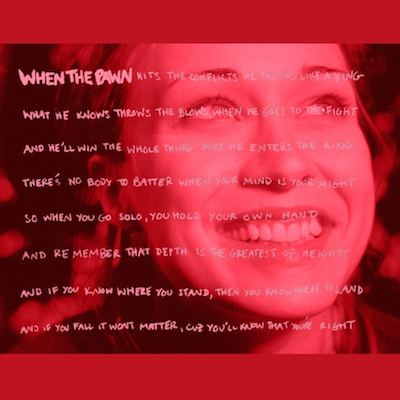8. Fiona AppleWhen The Pawn…

This is a really important record to me because it’s Fiona Apple who basically taught me how to play piano. I never had piano lessons in my life, my parents couldn’t afford to send me and it wasn’t an option for us. When I finally got to university, I used some of my student loan to buy a small keyboard from Argos. It was probably way more than I should have spent on something that wasn’t food but I was harbouring this secret plan that I wanted to be a songwriter and a producer and knew that I needed to play more than guitar, something that I’d already taught myself to play.
There weren’t many piano equivalents of the guitar tab books that were around at the time, but Fiona Apple did have this music book for Tidal, her first record. I bought that and was just thinking ‘Fuck! I’m never going to be able to do this!’ She has quite complex jazz chords – and that’s not the kind of thing you want to be tackling when you first start playing. I remember the girls in my halls – many of whom had grade eight piano – were taking the piss out of me, trying to teach myself. Here I was, trying to play ‘Pale September’ by Fiona Apple as my first attempt on the piano!
But there was something about this record that opened everything up. It was a very kind of rhythmic way of writing, almost rapping – I know Kanye West has gone on to say it was a massive influence on him – in terms of his metrical rhythms. For me, it hugely influenced my approach to the instrument in that her music taught me how to play that instrument so I guess it finds itself seeping into my playing because the chords she used are the ones I taught myself. It’s the same way I taught myself to play guitar with Radiohead, you’ll find all those sounds in my music too.
Lyrically, her bluntness and honesty with confronting the really ugly side of life is something I really admired. I loved how vitriolic her lyrics were too. When I first started doing The Anchoress, I tried to frame it in this really digestible way as ‘revenge pop’, and that definitely came from songs like ‘Fast As You Can’ and ‘Get Gone’ from this album, which had this ‘fuck you’ attitude. It wasn’t like ‘oh poor me, you’ve broken my heart’ – it was like, ‘it won’t be long until you’re lying limp in your own hand’, this fantastic image of some guy jacking himself off in his own misery because they’d broken up – it was a woman refusing all those tropes of passive victimhood and showed that women can write just more than being heartbroken from that vulnerable place.


